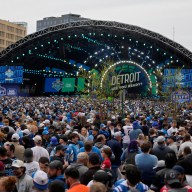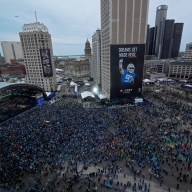Garrett Hedlund is a man of few words. He’s laconic, laidback, almost aloof, but with a strange sense of humor that comes out at random moments. That’s why one of many reasons it was tough, at first, for him to act in “Billy Lynn’s Long Halftime Walk,” the latest from Ang Lee. The film concerns a young soldier (played by Joe Alwyn) sifting through traumatic memories of the Iraq War while his troop is honored at a football game. Hedlund plays the hepped-up sergeant. For one thing, it requires the actor to speak a lot and at great speed. For another, Lee shot the film in a radical, revolutionary new technology called “high-frame rate”: a new kind of digital cinematography that makes everything look hyper-real. Hedlund — of “On the Road,” “Tron: Legacy” and the original “Friday Night Lights” movie — talks to us about learning to act while not looking like he’s acting, boot camp and staying off social media. He also gave us a cigarette while we talked, which was our first time smoking with a famous person. So that was nice. RELATED: Interview: Steve Martin talks about “Billy Lynn” and his serious side It can be jarring, at least at first, to see a movie shot in high-frame rate. When you finally saw it, did it take a while for you to get used to it? It looks almost the same, just a little blurry. Did you find that the high-frame rate required you to change how you acted? If you’re really stylized with the high-frame rate, it can makes actors look fake. Did you have any other concerns? Why do you think you’re so often cast as Southern if you’re from Minnesota? Maybe people assume you’re Southern? You have to speak speak really fast, as you said. Was that difficult? This would make a good double feature with “Inside Llewyn Davis,” in which you’re the opposite: You speak maybe two words. Tell me about the boot camp. Boot camp sounds rough for anyone, but I’m sure actors don’t take it particularly well. It’s addictive. It’s a 24-7 job being on social media.
I did. My eyes adjusted throughout it. I also thought, at any point, if I took those glasses off, I would be like, ‘Whoa.’ I took them off during one scene, just to see what it looked like.
Yep.
Ang, when I first met with him, said, “If you to act, it’s going to look like you’re acting.” That was a little intimidating. Because I knew we had some big scenes. I was like, ‘Oh, I’m f—ed. The reason I was cast was because I’m an actor. Now he’s telling us not to act.’ But I guess it worked out. [Laughs]
Other than that it was more about … Look, I’m not Southern; I just play a lot of Southern roles. [Laughs] It was about making me sound Southern and talking fast and f—ing getting the point across. That was it.
No f—ing clue.
Ever since “Country Strong,” they’ve been like, “He’s a cowboy, I guess.”
Yeah. [Laughs] There was a military supervisor that we had. He had a similar life to [his character]. He was a very fast talker — which I’m not. Ang said to me, soon as I met him, “This is your character.” I was like, ‘Alright.’
[Big laugh] Yeah.
We’d do an eight-mile rock backpack run. They sprayed us with a firehose while we were upside down over a puddle. They made us do port side and bow side with f—in’ telephone poles. This [drill sergeant] would yell at me: “You that f—ing actor who was on ‘Friday Night Lights’?” I’d say, “Yes, sir.” He said, “I’ve worked too hard to become a ‘sir.’ You call me ‘Master Chief Hoffman.’” I’d say, “Yes, sir.” He’d say, “Do not call me ‘sir’!” [Laughs] Later I discovered he was the motherf—er who trained everyone on [“Friday Night Lights” film director] Peter Berg’s other films, on “Lone Survivor” and everything else. But yeah, for the first day it felt like s—.
They took everyone’s phones away from them. There was a group of guys that have big Twitter followers and stuff like that. They felt like they were missing their fans. I’ve never been on it. I thought it was funny that a group of guys would be missing their Twitter fans more than paying attention to the film we’re doing. But they broke them out of that.
Turns out.
Garrett Hedlund on ‘Billy Lynn’ and not doing the social media thing
Follow Matt Prigge on Twitter @mattprigge


















